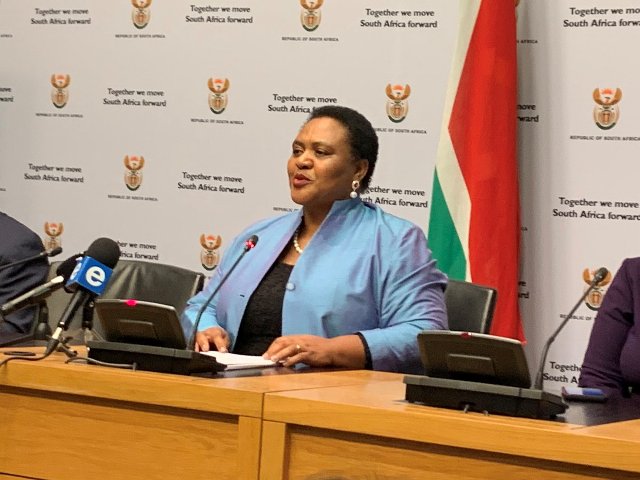Parliament Boosts Committee Funding and Oversight as Budget Vote Prioritizes Reform
The announcement was made by National Assembly Speaker Thoko Didiza during Parliament’s Budget Vote presentation in Cape Town, where she tabled the institution’s R5.08 billion spending plan.

- Country:
- South Africa
In a landmark move to enhance the operational efficiency and oversight capability of South Africa’s legislative arm, each Parliamentary portfolio committee will receive an allocation of R3 million for the 2024/25 financial year. The announcement was made by National Assembly Speaker Thoko Didiza during Parliament’s Budget Vote presentation in Cape Town, where she tabled the institution’s R5.08 billion spending plan.
The dedicated committee funding is aimed at improving planning, enhancing resource visibility, and enabling more effective performance across the more than 30 portfolio committees that form the backbone of Parliament’s oversight and legislative functions.
“What drives our processes in Parliament are committees. It is therefore important to ensure that committees are adequately resourced and have an insight into the resources they have on an annual basis for better planning,” said Speaker Didiza.
Budget Priorities: Restoration, Oversight, and Public Engagement
Parliament’s total allocation from the National Treasury for 2024/25 stands at R3.58 billion, with a significant additional R500 million earmarked for the restoration and refurbishment of parliamentary infrastructure damaged by the 2022 fire. The rebuilding project is expected to address longstanding issues such as inadequate broadcasting facilities in committee rooms, a key component for transparency and public education.
“Our Parliamentary broadcasting services continue to ensure that the public is educated on the work of Parliament. We are conscious that not all committee rooms are equipped with such facilities. We will ensure that the rebuilding project finally addresses this situation,” Didiza said.
To expand public engagement, Parliament's communication services have launched regular cluster briefings. These initiatives aim to empower citizens by providing accessible updates on the work of various committees.
Research, Language, and Digital Capacity Upgrades
In direct response to concerns from Members of Parliament over insufficient support services, Speaker Didiza outlined plans to strengthen research and language services. Parliament is currently appointing additional researchers and language practitioners, ensuring that the National Assembly, the National Council of Provinces (NCOP), and relevant committee sessions are adequately supported.
Furthermore, the Information and Communications Technology (ICT) unit is being bolstered. Recruitment is underway for a Chief Information Officer, signaling a renewed focus on digital modernization to better service MPs and streamline legislative workflows.
Legacy Issues: Advancing the Asmal Report and Other Key Recommendations
Tackling unresolved matters from previous legislative terms, Speaker Didiza committed Parliament to accelerating the implementation of recommendations from various reports, most notably the Asmal Report. Officially known as the Ad Hoc Committee Report on the Review of Chapter Nine and Associated Institutions, the report calls for improved oversight of independent constitutional bodies such as the Public Protector and the Human Rights Commission.
“Although this process is not complete, certain issues have been raised and are common across institutions, such as effective reporting to Parliament and inconsistencies in appointment processes of office bearers,” she said.
The Speaker also referenced work on recommendations from the High-level Panel on the Assessment of Key Legislation and the Acceleration of Fundamental Change, indicating that related outputs have been channeled into various committees for follow-up and action.
Progress on Implementing State Capture Recommendations
Speaker Didiza noted noteworthy legislative progress in response to the recommendations of the Judicial Commission of Inquiry into State Capture, which probed corruption and fraud across multiple government institutions. A suite of new and amended laws have been passed to tighten governance and prevent future abuses of power. These include:
-
The Electoral Reform Consultation Panel, approved in 2024
-
The Financial Matters Amendment Act
-
The General Laws Amendment Act (focused on anti-money laundering and terrorism financing)
-
The National Prosecuting Amendment Act
-
The Judicial Matters Amendment Act
-
The National Small Enterprise Amendment Act
-
The Public Procurement Act
-
The General Intelligence Laws Amendment Act
These legislative efforts demonstrate Parliament’s commitment to building stronger institutions and reinforcing the rule of law in the aftermath of systemic governance failures.
Caring for Former MPs
In addition to institutional improvements, Parliament has also budgeted R71.2 million to cover medical aid contributions for former Members of Parliament and Provincial Legislatures, underscoring a commitment to the welfare of those who have served in public office.
A Parliament Geared for Reform
Speaker Didiza’s Budget Vote speech underscores a broader transformation agenda for South Africa’s Parliament. With a focus on well-resourced committees, robust oversight, institutional modernization, and public transparency, the 7th Parliament is positioning itself to be more proactive, accountable, and responsive to the nation’s developmental needs.










